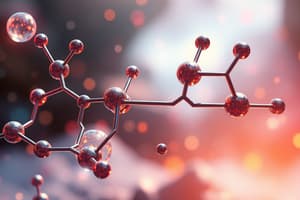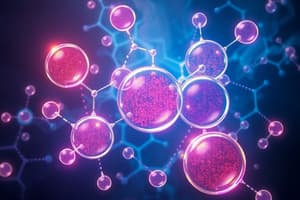Podcast
Questions and Answers
What is the most abundant hydrocarbon in the world?
What is the most abundant hydrocarbon in the world?
- Methane (correct)
- Ethane
- Propane
- Butane
What type of molecules are alkanes?
What type of molecules are alkanes?
- Polar
- Non-polar (correct)
- Hydrophilic
- Hydrophobic
What is the most important factor that determines the volatility of an alkane?
What is the most important factor that determines the volatility of an alkane?
- The number of hydrogen atoms
- The number of carbon atoms
- The length of the chain (correct)
- The type of atoms
Flashcards are hidden until you start studying
Study Notes
- Alkanes are a class of organic compounds consisting of only carbon and hydrogen atoms.
- Alkanes are the simplest and most abundant hydrocarbons in the world.
- Alkanes are composed of single carbon atoms linked together in a chain or ring structure, with each carbon atom bonded to three hydrogen atoms.
- Alkanes are generally non-polar molecules, meaning that they don’t easily mix with other substances.
- Alkanes with shorter chains are more volatile and have lower boiling points than those with longer chains.
- Alkanes are a very important part of organic chemistry, and understanding their structure and properties is essential for any student studying this field.
- Alkanes are used in a variety of industries, from energy to cosmetics, and understanding how they work and interact with other substances is important for any chemist.
- Alkanes are also used in the production of many everyday items, so understanding their structure and properties is essential for any student interested in the chemistry of everyday products.
Studying That Suits You
Use AI to generate personalized quizzes and flashcards to suit your learning preferences.




